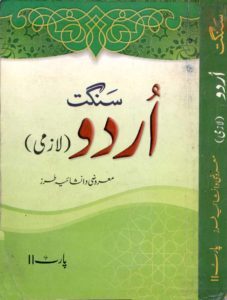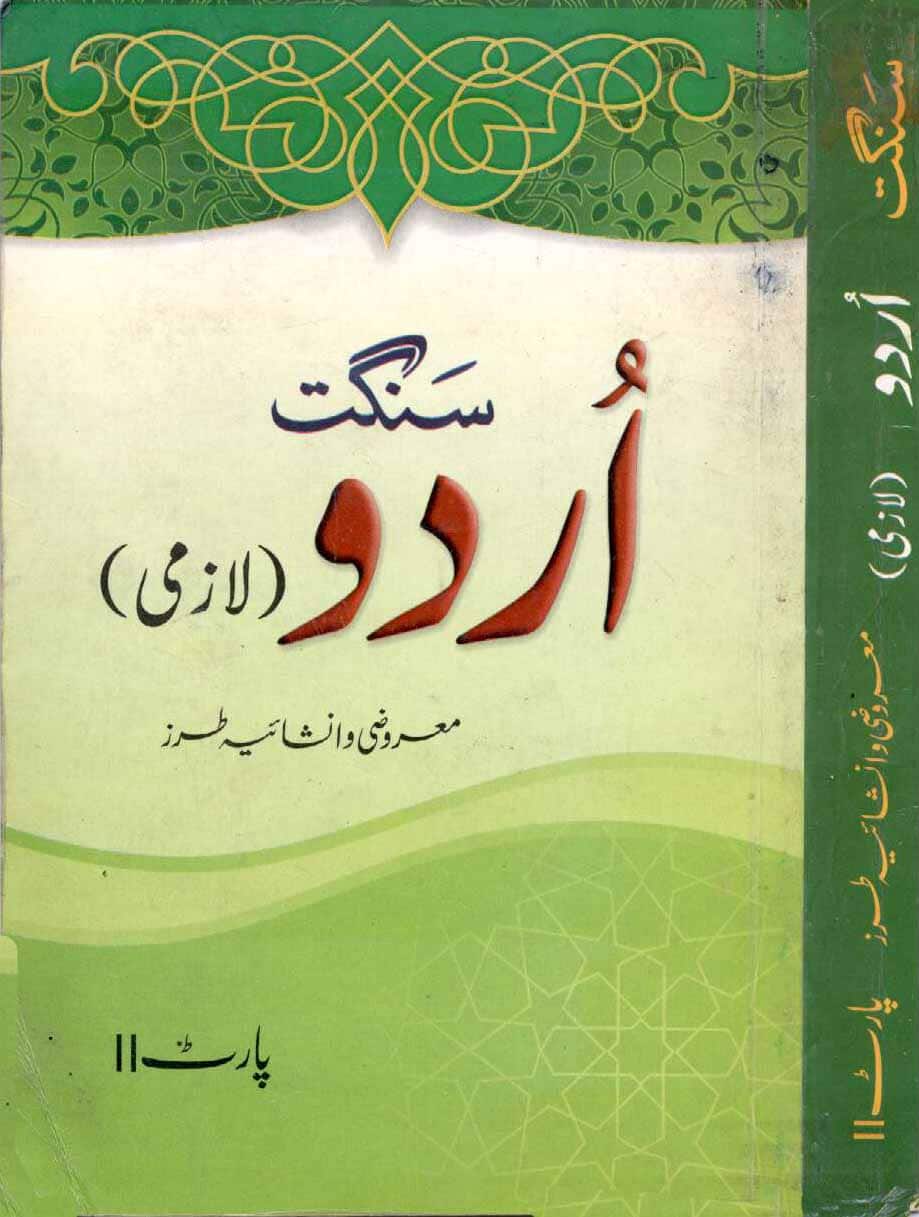 Free download the book “Snaggat Urdu” is a key book for “Urdu (Sarmaya-e-Urdu)” for 12th class. Urdu Part 2 is a compulsory subject of Intermediate second year. This book covers both subjective and objective part of course.
Free download the book “Snaggat Urdu” is a key book for “Urdu (Sarmaya-e-Urdu)” for 12th class. Urdu Part 2 is a compulsory subject of Intermediate second year. This book covers both subjective and objective part of course.
This book is published by Sanggat Publications Faisalabad and authors of the book are
- Prof. Mohammad Masood Akhtar
- Prof. Dilshad Ajmal
- Prof. Nisar Ahmed Alvi
- Ghazala Parvez
- Prof. Muhammad Afzal Hameed
- Prof. Abdul Khaliq Malik
- Mirza Khalid Mahmood
- Prof. Rubeena kosar
Going past the generalization of Urdu – excessively impacted by ’emotionalism’ and ‘dissent news coverage’, Shafey Kidwai in his book ‘Urdu Writing and News-casting: Basic points of view’s has given the dialect another life in its seniority. Kidwai has inventively supported the basic examination of the best faultfinders in the book and has brought it into a pristine light.
He has talked about the development of the dialect, its work day from sentimentalism to dynamic to cutting edge composing, and after that mourned over Urdu enduring the worst part of segment.
To start with of its kind, Kidwai’s critique has investigated every possibility to attest how Urdu writing signifies the majority in elucidations and a not insignificant rundown of essayists of the dialect have an extraordinary ontological introduction.
The book holds an adequate scope on Ghalib, Firaq, Faiz, Iqbal, Rabindranath Tagore, Munshi Premchand, Manto and Kalam, Sir Syed Ahmad Khan and Josh.
One full paper is devoted to Honorable laureate Rabindranath Tagore. Kidwai has recognized and portrayed a definite synopsis with respect to the impact of Tagore on Urdu essayists like Munshi Premchand (The well-known ‘Kalam ka Sipahi’) and Josh. In view of some legitimate records by contemporary essayists, Kidwai has drawn a completely clear casing that both Dr Sir Mohammad Iqbal and Tagore affected each other. In a letter to Abbas Ali Khan Lama Hyderabadi, applauding Iqbal’s innovative virtuoso, duplicated by Kidwai, Targore stated: “Being not familiar with the dialects in which Iqbal composed I couldn’t comprehend the profundity of his innovativeness and I could scarcely set out to express my conclusion about his verse. Iqbal’s ubiquity prompts me to trust that his couplets are gems that have the brilliance of the unending length of time of writing.”
As Rabindranath Tagore is loved by numerous as God, the book has featured his opposite side as well. Josh Malihabadi in his collection of memoirs ‘Yaadon ki Baraat’ has expounded on his a half year at Santiniketan with Tagore – “He (Tagore) was fixated on a thing that left me totally irritated. It was his affinity for attention. It generally filled me with a profound feeling of abhorrence. At whatever point a nonnative desired his meeting; he would sit at a high-up put in the wake of getting himself completely spruced up. Ambergris would illuminate behind him. Completely encompassed by wonderful young ladies he would give the meeting in such a way, to the point that the meeting searcher would get the feeling that he was addressing a holiness.”
Not at all like others, Kidwai has applauded Jayant Parmar by calling him the primary voice of Dalit verse in Urdu and has given an adequate space to his one of a kind accomplishments.
Kidwai has set Ghalib above William Shakespeare in a progression of legends. “Dr Abdul Latif’s endeavors to contrast Ghalib and Shakespeare and some other western artists after fundamentally taking a gander at Ghalib’s English book ‘Ghalib’ were done keeping in mind the end goal to bind him,” he notes.
Other than portraying the historical backdrop of Urdu News coverage, the author credits Sir Syed Ahmad Khan for being the primary Urdu columnist to sow the seeds of Improvement News coverage. After fundamentally investigating the articles composed by Sir Syed in his Aligarh Foundation Paper against the self-important and self-arrogant English authorities, for which Syed got cautioning from the outsider government, Kidwai questions marking of Sir Syed as a partner of the English. “Sir Syed’s pen was completely coordinated towards mitigating the state of Indians. By what method can a man who distributed resentful articles against English be depicted as a theological rationalist for the English manage?” Kidwai mourns. With this all around looked into wellspring of data, the creator has handed another page over the historical backdrop of Urdu news-casting.
The compilation of incredible considerations and innovative attestations, Shafey Kidwai’s book is a gem in itself, just a single need to keep an English word reference open in other hand while perusing.

Please share part 1 11th class guide book
It was very good and valuable information, thanks a lot.
Hello Dear Free Books Team,
i hope you are doing very well! i am searching lots of time to find the books of tabeer urdu online, but i find today in your blog.
just i want to say thanks.
Ksy download krna ha yar………horai e nai ha….😥
Just click the download button below the post and click on any social like the button to start download
Hi, there Guys Hope you are all doing Great and Fine!!
I came across your website and find out that it has information related to Tabeer Online And
I have to say that it was very good and valuable information.
Thanks a lot, guys for the help.
Punjabi and
Islamiyaat Ikhtyaari ki guide ho gi plz send me
Kasy download karon add a jata hy…03156779967 any one plz WhatsApp me this book…plzz
Konsi book?
Thanks sir please upload business statistics for I.Com
Thank you Sir ✌🏻✌🏻
Thanks alot
Thank ueh
many many thankx for this book and sir plz upload business statistic for i.com part 2 lahore board